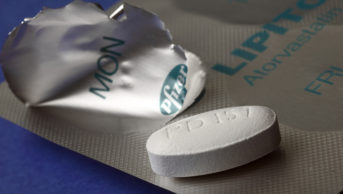
Shutterstock.com / JL
When Deepak Bhatt presented the results of a trial of icosapent ethyl, a component of fish oil, on cardiovascular health at the American Heart Association meeting in Chicago, Illinois, in November 2018, the audience burst into applause upon seeing the data, rather than waiting for the end of the talk.
“I haven’t seen that in a couple of decades,” says Bhatt, a professor of cardiovascular medicine at Brigham and Women’s Hospital and Harvard Medical Center in Boston, Massachusetts, who led the 11-nation ‘Reduction of cardiovascular events with icosapent ethyl-intervention trial (REDUCE-IT)’ study[1]
. “But it is a rare thing that a trial is quite as positive as this study has been.”
The results were plain: patients given icosapent ethyl — an omega-3 fatty acid marketed as Vascepa by New Jersey biopharmaceutical company Amarin — had a 25% relative-risk reduction in cardiovascular events, such as heart attacks, strokes and death, compared with controls. The finding has jolted the field, coming after a collection of negative findings on the effects of fish oil-derived compounds on cardiovascular health published in 2018. These include the ‘A study of cardiovascular events in diabetes’ (ASCEND) trial, which found no benefit in people with type 2 diabetes mellitus[2]
; the ‘Vitamin D and omega-3 trial’ (VITAL), which found no benefit in nearly 26,000 participants[3]
; a Cochrane review of 79 trials involving more than 112,000 people and a meta-analysis of 10 trials involving more than 77,000 people[4],[5]
.

Source: Dr. Deepak L. Bhatt
Deepak Bhatt, a professor of cardiovascular medicine at Brigham and Women’s Hospital and Harvard Medical Center in Boston, Massachusetts, led the REDUCE-IT study, which showed that icosapent ethyl, a component of fish oil, reduces cardiovascular risk in those already taking a statin
“I actually think a lot of people haven’t been paying attention to this space because they just saw the meta-analysis and everything and figured, ‘Aw, this field is dead’,” Bhatt says.
Originally inspired by epidemiology noting low rates of cardiovascular disease in people living on the coast, studies of fish oil and its various components have produced a slate of mixed results. Despite the ambiguity, enthusiasm for fish oil supplements has soared among consumers globally, who spend more than £1bn each year to take them for diverse ailments. Now, researchers are working to separate the real benefits from the imagined ones; for pharmaceutical companies, this means isolating the main ingredients of fish oil.
For more than a decade, these companies have been developing fish oil-derived compounds which, unlike common dietary supplements, contain purified omega-3 fatty acids with fixed formulations in consistent doses. Using these compounds, the new crop of trials — both positive and negative — suggests researchers are narrowing in on the precise ingredients, dosage, treatment time and group of people that matter for reaping a cardiovascular benefit.
It makes this a very lively area of discussion, which is always a good thing for medical research
“There is a lot of enthusiasm for taking these types of supplements, so I think it would be important to have guidance about what the medical recommendations are,” says Louise Bowman, a professor of medicine and clinical trials at the University of Oxford, UK, and ASCEND trial leader.
To Bowman, the timing of the negative ASCEND results, quickly followed by the positive REDUCE-IT trial was fortuitous. “I think it makes this a very lively area of discussion at the moment, which is always a good thing for medical research,” she says.
Fishy fanfare
Although the science remains uncertain, many people are willing to try fish oil supplements for their ailments — not only to prevent cardiovascular disease, but to guard against cancer and help with hypertension, joint pain, mental health and even complexion. These capsules contain a mixture of molecules squeezed out of oily fish, such as salmon, mackerel and sardines, including omega-3 fatty acids, such as eicosapentaenoic acid (EPA) and docosahexaenoic acid (DHA), and a myriad of other fatty acids, including the unhealthier saturated ones. The stated fatty acid content and dosage on the label often does not match what is really inside the fish oil capsules, which is no surprise given the lack of regulation over dietary supplements[6]
.
These supplements are expensive and there’s actually good evidence that they don’t provide cardiovascular benefit
Although taking these supplements might seem like harmless bet-hedging by health-minded people, there might be a downside if people forego medicines, such as lipid-lowering statins. “These supplements are expensive,” Bhatt says, “and there’s actually good evidence that they don’t provide cardiovascular benefit.”
Yet, the medical establishment wavers on the question of fish oil for cardiovascular health. The American Heart Association recommends eating fish twice per week, and in some cases to seek advice from doctors about fish oil supplements; however, the British Heart Foundation only mentions fish as part of a healthy diet. In 2017, NHS England recommended that GPs should no longer prescribe omega-3 fatty acid compounds for diverse conditions, including non-alcoholic fatty liver disease, after heart attack, multiple sclerosis and sleep problems related to autism. Ending these “low-value” prescriptions could save more than £6m per year, it said.
And yet, the field has not let go of the possibility that some benefit may be extracted from fish oil. Since 2004, the US Food and Drug Administration has approved four fish oil-derived products for lowering extremely high levels of triglycerides (≥500mg/dL), which are linked to artery-narrowing plaque growth and cardiovascular disease. GSK’s Lovaza (Omacor in the UK) — a mixture of EPA and DHA in ester forms — came first, followed by a similar compound called Omtryg (Trygg Pharma) in 2014; two generic versions have since emerged. In 2014, AstraZeneca’s Epanova was also approved, which contains EPA and DHA as free fatty acids, rather than ethyl esters, to aid bioavailability. Amarin’s Vascepa, the drug used in REDUCE-IT, was approved in 2012; unlike the others, it contains only icosapent ethyl, a form of EPA[7]
.
Even with a more controlled medicine in hand, benefits have been hard to come by for populations beyond the narrow hypertriglyceridemia case. The recent VITAL trial tested 1g of Omacor per day in a relatively healthy population aged 50 years or older: after a median follow-up of five years, those on Omacor and those on placebo had similar numbers of cardiovascular events and cancer diagnoses. Likewise, the ASCEND trial looked at people with diabetes, which heightens risk for cardiovascular disease. A low, daily 1g dose of Omacor over seven years (average) also did not reduce the number of vascular events, such as heart attack or stroke, compared with controls taking placebo.
The results did not surprise Bowman, owing to the low dose used. “You have to remember we designed the trial back in 2003,” she says. “Since then, evidence has been accumulating that perhaps the lower dose isn’t as promising as we had first thought based on earlier studies.”
Stand out study
REDUCE-IT focused on people at risk of cardiovascular disease with moderately elevated triglycerides (135–499mg/dL) who were already taking a statin. People with these levels will often take statins to lower their risk by 25–35%. Bhatt and colleagues tested whether icosapent ethyl could chip away at the residual risk when participants took two capsules twice a day, with a high daily dose of 4g.
Most people enrolled in the trial had established cardiovascular disease, while others had diabetes plus one more risk factor. Altogether there were 8,179 people in the trial, mainly from countries with western diets. During five years of follow-up, 17% of those in the icosapent ethyl group had a cardiovascular event, including cardiovascular-related death, myocardial infarction, non-fatal stroke, revascularisation procedures (such as stents and bypass surgery), or angina; while 22% of those taking a mineral oil placebo had such an event. This difference not only amounted to a 25% relative risk reduction, but reductions were also seen across the board for individual event types. Based on these results, Amarin will seek regulatory approval for a new indication of Vascepa in 2019.
“This was the first time that a highly purified, pure omega-3 fatty acid was given in adequate doses for an adequate amount of time to an adequate number of people,” says John Kastelein, a professor of medicine at the University of Amsterdam, who wrote a commentary accompanying the REDUCE-IT publication[8]
. “Those three things are totally necessary to see an effect, for any drug really, so they kind of struck gold with this,” says Kastelein, whose own research focuses on pathogenesis of atherosclerosis and treatment of increased cardiovascular risk.

Source: John Kastelein
John Kastelein, a professor of medicine at the University of Amsterdam, says that the REDUCE-IT trial was the first time that a highly purified, pure omega-3 fatty acid was given in adequate doses for an adequate amount of time to an adequate number of people
The result is in keeping with the ‘Japan EPA lipid intervention (JELIS)’, an earlier trial which found that a lower, 1.8g daily dose of purified EPA reduced cardiovascular events in a statin-treated Japanese population by 19%. JELIS did not capture much attention at the time, since it involved a population for whom fish is a staple food, and it did not have a placebo group[9]
.
The mineral oil is a little stain on everything, but it probably only explains a few percent of the effect
Some have pointed to a snag in REDUCE-IT: during the trial, the control group had an unexpected increase in levels of fat-carrying lipoproteins, particularly one that transports low-density lipoprotein cholesterol (LDL-c). This suggests the mineral oil placebo may have somehow interfered with statin absorption. Mineral oil is a known laxative, and 35% of control participants reported gastrointestinal symptoms in the trial, while slightly — though significantly — fewer in the icosapent ethyl group reported these (33%).
If true, this would not undercut the main finding of REDUCE-IT, Kastelein says. “The mineral oil is a little stain on everything, but it probably only explains a few percent of the effect.” He notes corn oil would have been a better placebo.
Bhatt refers to this critique as “mineral oil madness”, given that the commonly used mineral oil has never before engendered a warning about toxicity or medicine malabsorption. In addition, a subgroup comparison found that the effect of icosapent ethyl was similar in controls with an LDL-c increase and in those without.
“People use mineral oil in much larger amounts than we used here, and so if it’s really that bad, then we have a bigger problem and we need to get mineral oil off the shelves,” he says. “I don’t really think there’s anything to [this argument]. I think it’s just a very positive trial and sometimes when that happens, people try to nitpick little things.”
On the level
How exactly icosapent ethyl reduced cardiovascular risk remains unclear (see Box).
Box: How does icosapent ethyl work?
Exactly how icosapent ethyl works is still being figured out. As expected, it lowered triglycerides, but this did not track with the degree of risk reduction seen in the ‘Reduction of cardiovascular events with icosapent ethyl-intervention trial’ study, suggesting other mechanisms are afoot. Eicosapentaenoic acid also has anti-inflammatory and anti-oxidative properties, as well as plaque and membrane-stabilising actions. One idea is that icosapent ethyl could quell inflammation of arteries, a dangerous situation that can rupture plaques, leading to heart attack. Another trial, due to complete later in 2019, seeks to directly visualise icosapent ethyl’s effects on coronary plaques[10]
.
Another question is why REDUCE-IT succeeded in finding a cardiovascular benefit when the others did not: was it the high dose of an omega-3 fatty acid that mattered, or was it the icosapent ethyl-only formulation? All other fish oil-derived compounds studied, such as Omacor, contain a mixture of EPA along with DHA. DHA lifts LDL-c levels, potentially offsetting some of EPA’s benefit.
Some lean toward the high doses of omega-3 fatty acids as being the major factor, as they are necessary for lowering extremely high triglyceride levels. But EPA may be special in its own right, too.
“It is beginning to be an attractive thought that EPA does the job and that you need quite a lot of it to achieve what you want,” Kastelein says.
A test of this idea will come from an ongoing trial called ‘Statin residual risk reduction with Epanova in high cardiovascular risk patients with hypertriglyceridemia’ (STRENGTH)[11]
, which Kastelein is helping to lead. STRENGTH will evaluate whether a 4g daily dose of Epanova — a mixture of EPA and DHA — gives a cardiovascular benefit to people with risk similar to those studied by REDUCE-IT. This dose of Epanova results in EPA levels in blood approaching those in REDUCE-IT and JELIS[12]
. If cardiovascular benefits similar to those in REDUCE-IT are found, then circulating EPA levels likely drive the results.
It’s definitely thought provoking, but I don’t think people will change practice overnight on the basis of this
Pharmacists have taken notice of the REDUCE-IT trial, though prescribing practices or hospital formularies remain unchanged.

Source: Alison Warren
Alison Warren, a pharmacist specialising in cardiology at Brighton and Sussex University Hospitals NHS Trust, says that the REDUCE-IT trial is thought-provoking, but she does not believe it will lead to a change of practice overnight
“It’s definitely thought provoking, but I don’t think people will change practice overnight on the basis of this,” says Alison Warren, a pharmacist specialising in cardiology at Brighton and Sussex University Hospitals NHS Trust. She notes that the REDUCE-IT results are drawn from a specific group of people with elevated triglycerides; it remains to be seen whether icosapent ethyl would have similar risk-reducing effects in a broader pool of patients.
“Definitely [REDUCE-IT] seems to buck the trend,” she says. “Maybe it’s the formulation that matters, maybe it’s the dosage, maybe it’s the cohort — it will be interesting to see.”
References
[1] Bhatt DL, Steg G, Miller M et al. Cardiovascular risk reduction with icosapent ethyl for hypertriglyceridemia. New Engl J Med 2019;380(1):11–22. doi: 10.1056/NEJMoa1812792
[2] ASCEND Study Collaborative Group. Effects of n−3 fatty acid supplements in diabetes mellitus. New Engl J Med 2018;379(16):1540–1550. doi: 10.1056/NEJMoa1804989
[3] Manson JE, Cook NR, Lee IM et al. Marine n−3 fatty acids and prevention of cardiovascular disease and cancer. New Engl J Med 2019;380(1):23–32. doi: 10.1056/NEJMoa1811403
[4] Abdelhamid AS, Brown TJ, Brainard JS et al. Omegaâ€3 fatty acids for the primary and secondary prevention of cardiovascular disease. Cochrane Database of Syst Rev 2018;(11):CD003177. doi: 10.1002/14651858.CD003177.pub4
[5] Aung T, Halsey J, Kromhout Det al. Associations of omega-3 fatty acid supplement use with cardiovascular disease risks: meta-analysis of 10 trials involving 77,917 individuals. JAMA Cardiology 2018;3(3):225–234. doi: 10.1001/jamacardio.2017.5205
[6] Mason RP & Sherratt SCR. Omega-3 fatty acid fish oil dietary supplements contain saturated fats and oxidized lipids that may interfere with their intended biological benefits. Biochem Biophys Res Commun 2017;483(1):425–429. doi: 10.1016/j.bbrc.2016.12.127
[7] Ito MK & Santos RD. PCSK9 inhibition with monoclonal antibodies: modern management of hypercholesterolemia. J Clin Pharmacol 2016;57(1):7–32. doi: 10.1002/jcph.766
[8] Kastelein JJP & Stroes ESG. Fishing for the miracle of eicosapentaenoic acid. New Engl J Med 2019;380(1):89–90. doi: 10.1056/NEJMe1814004
[9] Yokoyama M, Origasa H, Matsuzaki M et al. Effects of eicosapentaenoic acid on major coronary events in hypercholesterolaemic patients (JELIS): a randomised open-label, blinded endpoint analysis. Lancet 2007; 369(9567):1090–1098. doi: 10.1016/S0140-6736(07)60527-3
[10] Budoff M, Muhlestein JB, Le VT et al. Effect of Vascepa (icosapent ethyl) on progression of coronary atherosclerosis in patients with elevated triglycerides (200–499 mg/dL) on statin therapy: rationale and design of the EVAPORATE study. Clin Cardiol 2018;41(1):13–19. doi: 10.1002/clc.22856
[11] Nicholls SJ, Lincoff AM, Bash D et al. Assessment of omega-3 carboxylic acids in statin-treated patients with high levels of triglycerides and low levels of high-density lipoprotein cholesterol: rationale and design of the STRENGTH trial. Clin Cardiol 2018;41(10):1281–1288. doi: 10.1002/clc.23055
[12] Maki KC, Orloff DG, Nicholls SJ et al. A highly bioavailable omega-3 free fatty acid formulation improves the cardiovascular risk profile in high-risk, statin-treated patients with residual hypertriglyceridemia (the ESPRIT trial). Clin Ther 2013;35(9):1400–11. doi: 10.1016/j.clinthera.2013.07.420


